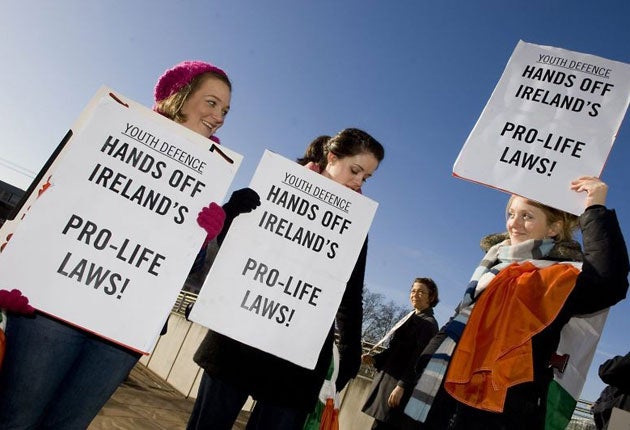A matter of life and death – Irish abortion law in dock
Three women launch landmark case in Strasbourg that could overturn Ireland's ban on terminations

Ireland's almost complete ban on abortion was challenged before 17 European judges yesterday as a violation of fundamental human rights.
Three women, named only as A, B and C, brought a landmark case before the European Human Rights court in Strasbourg, the outcome of which could force Ireland to weaken its strict laws against abortion for the first time in 17 years.
The three plaintiffs – two Irish women and a Lithuanian – say that their own rights to health and life were threatened by pregnancies which they could not terminate legally in Ireland the only EU state other than Malta, with a near outright ban on the procedure. Like an estimated 7,000 Irish women a year, the three women travelled to the UK to obtain legal abortions in Britain.
The case is, in theory, not a frontal assault on a ban which has been enshrined in Irish law for more than a hundred years and reinforced in the Irish constitution since 1983. It is an attempt to clarify and widen the exception, approved in 1992, which permits a pregnancy to be terminated when a woman's life is threatened. Nonetheless, the Irish government fears, and pro-abortion campaigners hope, that a court ruling in the women's favour could lead to a de facto unravelling of Irish abortion law.
Ireland's Attorney General, Paul Gallagher, pleaded with 17 judges sitting in the Grand Chamber of the European Court of Human Rights in Strasbourg to accept that Ireland's abortion laws sprang from "profound moral values" which are "deeply embedded" in the country's history and traditions. The Irish Republic's position on abortion was not something imposed on the nation but had been democratically endorsed in three referendums and enshrined in protocols attached to the European Union's Maastricht and Lisbon treaties.
Mr Gallagher said the European Court of Human Rights – an agency of the 47 nation Council of Europe, not the European Union – had always accepted that human rights law should respect the diverse sensibilities of its member states. Article 2 of the Human Rights convention – the right to life – recognised that the unborn child should be protected. The challenge brought by A, B and C – sponsored by the Irish Family Planning Association – was, in reality, he said, an attempt to impose on Ireland the kind of liberal abortion laws found in other European countries.
Julie Kay, a Senior Counsel appearing for the plaintiffs, said that the right to abortion to save the mother's life, apparently granted in Ireland in 1992, was in fact "bogus". If an abortion was later judged to be unnecessary, an Irish doctor could be struck off or imprisoned for life. As a result, she said, no statistics existed to say whether any "legal" abortions had ever taken place in Ireland.
Ms Kay went on to describe the experiences of applicants A, B and C. In all cases, she said, their life and health had been threatened by their inability to obtain an abortion in Ireland.
"A" was an unemployed woman who suffered from "substance abuse" and post-natal depression. Her other children were in care. Applicant B had taken a morning-after abortion pill and was worried that it could lead to an ectopic pregnancy. Applicant C was in remission from cancer but could not find a doctor to tell her whether her chemotherapy might damage her foetus. All three, Ms Kay said, had been forced to borrow money to travel to Britain for abortions. This infringed the rights to health and well-being guaranteed by Article 8 and Article 14 of the European Convention on Human Rights.
The Irish government argues there is no medical evidence to substantiate the claims. But Dublin is obliged to take account of whatever verdict the court reaches in several months time. The last Irish case to be heard in the same court's Grand Chamber, in 1988, forced the repeal of the Republic's criminalisation of homosexuality.
Other restrictive abortion regimes
Approximately one-quarter of the world's population lives in countries where abortion is either banned outright or very tightly restricted. In Chile, Nicaragua and El Salvador, where the Catholic Church still holds huge sway, obtaining or performing an abortion is a criminal offence and can result in a prison sentence. Elsewhere across huge swathes of South America, Africa, the Middle East and South-East Asia, abortion is banned except when the woman has suffered rape or the pregnancy endangers her health or life. In most of western Europe abortion rights are well established: Ireland's ban on abortion except when the woman's life is in danger makes it an exception. Plans to relax strict rules on abortion in Spain recently brought one million protesters on to the streets of Madrid. Whereas in the US, the pro-life movement is campaignIng hard to tighten the rules.
Join our commenting forum
Join thought-provoking conversations, follow other Independent readers and see their replies
Comments
Bookmark popover
Removed from bookmarks